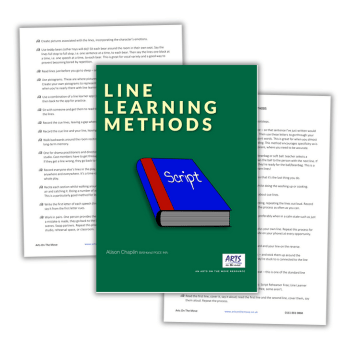It can be tricky to know how best to learn lines for a performance. There are a number of methods that you can use to help those lines to get into your head and stay there.
This resource pack, all about how to learn lines, collates lots of different methods. These will – hopefully – help students to remember and retain their lines for that great performance.
How to learn lines
Different strategies work for different people as we all learn in ways which are very personal to us. Younger students often remember lines better through visual or aural mnemonics. Some people learn better through the visual prompt of seeing words written down.
Some performers learn in a logical, almost mathematical, way. Others learn lines by getting up and ‘doing’. It all depends on the individual.
It’s a good idea to learn cue lines too at the same time as your own. This is the line that comes immediately before yours.
You can choose to remember a whole line or elect to learn just the last three or four words before your line.
The only danger with the latter is that some performers might paraphrase so badly that they completely leave out the ending of a sentence. This means they may not feed you accurate final cue words.
The more you know a script, the less likely you are to be thrown by words, lines, or even whole paragraphs, being omitted.
Written by experts
This pack about how to learn lines has been compiled from the personal experience of a youth theatre and am-dram director. There are also suggestions from a Facebook group of teachers, directors and drama practitioners. All suggestions, therefore, are based on great practical knowledge.
Drama practitioners, youth group leaders, and theatre directors need to have a variety of line learning strategies available to ensure that there’s a method which suits every cast member.
This pack provides something for everyone. Remember to use praise and support when supporting anyone who is trying to learn their lines. A little encouragement goes a long way!
Arts On The Move, run by Alison Chaplin, provides high-quality creative resources and support for teachers, drama practitioners, young actors and youth theatre directors.











